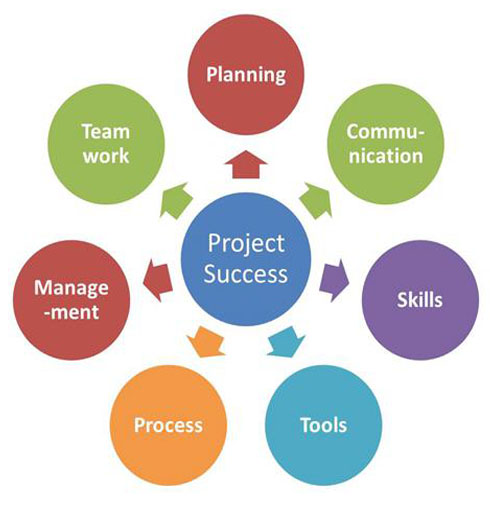While it’s important for a project manager to determine different elements of a project such as the cost, time and performance, this will only identify immediate problems. In addition, the project manager must also consider different company variables, such as culture or work flow. Proper communication between all concerning groups will help later on with planning, decision making and overall project success.

Groups:
There are three main groups that help determine the success of the project. This includes the project manager and their team, the organization and finally the customer. Each party impacts the success of a project and can just as easily hinder it.
1. Project Manager
Project managers can take multiple steps towards a successful project from the start. By choosing key team members with positive track records in their fields, the project manager will know their skill levels in anticipation of the project difficulty. From there, their team needs to form a commitment and sense of mission towards the project. The project manager needs to maintain a good relationship with the team since they will assist in problem solving and decision making. With the project and team being approved of, the project manager develops realistic costs, schedules, performance estimates and goals. Going along with this, they must anticipate potential problems and backup solutions. Therefore, they should avoid over reliance for one type of tool and keep changes under control throughout the project.
2. Organization
A project cannot be successful without the recognition and support of the project manager’s organization. They must maintain a good relationship between themselves, the project manager and the client. This can be done with showing enthusiasm and their commitment for the project. Once the organization chooses a capable project manager they should then set clear and workable guidelines.
3. Customer
The client will need to coordinate their efforts in order to establish reasonable goals and criteria for a project. This includes being provided with sufficient authority over things, such as decision making. This can be done with having prompt and accurate communications to be kept up to speed on the project. If a change occurs, the client should have well-establish procedures for changes made.
Expectations:
The responsibilities of a project manager come with expectations from their organization and team.
The organization will expect the project manager to take full accountability of the project’s success or failure as well as provide effective reports and information. The project manager works toward minimizing organizational disruptions and handle most interpersonal problems. Lastly, the organization expects the project manager to give recommendations, not just alternatives, to show growth with each assignment.
The team expect the project manager to help with the problem solving processes as well as give proper direction and leadership. The project manager acts as a spokesperson for the group and gives a representation to higher management. Internally, the project manager should provide a relaxed environment with informal interactions for the team while also reducing any conflict and allowing new members to adapt. The members have a need for a sense of belonging to the team, as well as an interest and respect for the work. It is the project manager’s job to help their team find this motivation and give them potential career growth.

9 Comments
Brandon Kresge · March 2, 2021 at 11:47 am
Great job on this! I think the pictures are really helpful, especially the second one. I like how you put the groups in chronological order. I also really like how you stated that the different elements are only immediate problems – it really shows how much work the project manager has to do. Being a project manager is a difficult role, as you have to balance out many aspects, but also be a leader to everyone. I feel like that is what is stopping a lot of people from being a project manager. I think the sense of belonging and attachment to the work is a really small but nice thing – everyone gets to know each other and are proud of everything they accomplish together.
Manogna Pillutla · March 2, 2021 at 2:37 pm
Everything is put really well together. Good work Autumn! There can be many reasons for success and failure of a project but the way you have organized this post gives clear boundaries to it. Specifying the three characters group in the project and importance of communication between them was good idea. I like the way you also focused on project manager and the roles for that position. Nice pictures.
Trisha Badlu · March 2, 2021 at 3:12 pm
Great post Autumn! You made a really good point in saying that each party has a high influence on the success of a project and it’s not just up to the project manager alone. The project manager should also have realistic expectations so that the team isn’t forced to do more than they can handle. With the project manager overseeing the overall project, it’s also their responsibility to ensure that communication between team members is as comfortable as possible.
Sean Kinneer · March 2, 2021 at 4:07 pm
I like how you organized your post, Autumn! You have a lot of good points. I like that you identified the three main groups and the expectations. It just shows how project success is dependent on all parties involved. There is only so much the project manager can do with their teams. The parent and customer organizations have their parts in contributing to a positive outcome. All organizations need to be involved and communicate. Quick, effective communication is key in problem solving. Teamwork from all parties is what ultimately leads to success in any area of life. I like that you said that project managers are expected to represent their teams and be their spokesperson. I have experienced being a part of a team before where the higher management did not understand the full process. In that situation, I luckily had a good team leader who was able to relay our concerns and stick up for us as well. Being a team member, it is very important to know that you have a leader that will have your back.
Brandon Sutton · March 2, 2021 at 4:45 pm
Bravo! I think your coverage of the different levels that contribute to success and how exactly they make these contributions was very well done. One point I really liked was the accountability of the project manager. Naturally, they’ll be more than pleased to take credit for success, but it’s just as important that they accept failures too, without scapegoating their lower-level workers.
Vivian Azar · March 2, 2021 at 4:59 pm
“Each party impacts the success of a project and can just as easily hinder it.” I like how to the point you are with just this one line, while showing how all three players are parts of the same whole. Nice job organizing the info. We can see how communication, among many other things, are very critical components to the success in each of the three groups, and ultimately the entire project.
Connor Ellis · March 2, 2021 at 5:17 pm
You bring a great main idea to this post. As much planning as the project manager does, there will come a time when they will have to make active decisions. A project manager can be judged based on how much preparation they do beforehand, and while doing prep is important, the success of the project will be based on how they can react to real life issues.
Griffin Nye · March 2, 2021 at 5:51 pm
Great work, Autumn! I think you covered the 3 main criteria for success very well in this post. I find the first two groups especially important, that the Project Manager selects good members for their team that is dedicated to the project, and that the Project Manager communicates well between the team members to work towards the project objective. Without a dedicated team all working together, dedicated and motivated to complete a project to the best of their ability, the project will be doomed to fail.
Chris Kelly · March 2, 2021 at 5:59 pm
Nice post, the pictures are very helpful for illusatrating the point.
“The organization will expect the project manager to take full accountability of the project’s success or failure”: This is important to note because even if there are many external factors the project manager has to deal with, the responsibility lies on the PM anyway. They can’t just blame it on a team member or the customer, so they have to balance many responsibilities at once to ensure success.